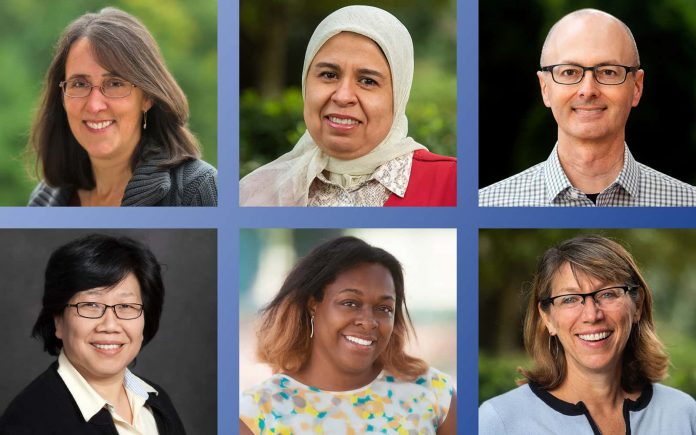A team of SCSU computer science and biology professors has received a $1.5M grant from the National Science Foundation (NSF) to launch an innovative program designed to recruit and develop students interested in computing and bioscience. The program is aimed at helping to fill an industry employment gap while bringing equitable opportunities to talented students with financial need.
The six-year program, “Preparing Computational Biologists for the New England Workforce” (ComBiNE), will award four-year scholarships to two cohorts of 11 and 12 scholars.
“Research shows that engagement and research is a way to retain students,” said Sahar Al Seesi, associate professor of computer science and principal investigator on the team. “We are very proud that we have a research component in the program.”
In addition to Al Seesi, the team of professors includes co-principal investigators Winnie Yu, professor of computer science; Nicholas Edgington, professor of biology; Elizabeth Roberts, professor and chair of biology; and Lisa Lancor, professor and chair of computer science. Also lending support is Therese Bennett, associate dean for STEM.
As computational biology uses computer science, statistics, and mathematics to solve biological problems, living in a post-pandemic world provides an unusual “benefit” — or more like a recruitment tool. The familiar life experience of having lived through a global pandemic is a concrete way to connect the dots in drawing students into the STEM program. Students want to have an impact on their world, Al Seesi said.
“We are living in the COVID-19 era,” Al Seesi said. “There are many vaccines being developed. These were based on analyzing the genome sequence of the virus or the genetic material of the virus.
“A lot of students were very excited to learn about the program. [COVID] touches their lives and they hear about it in the media and realize, ‘I can write a program that can help in the design of a vaccine,’” Al Seesi added.
The ComBiNE program at Southern will launch as employment in STEM occupations is soaring but showing signs of a shortage of qualified employees. STEM jobs are projected to grow 11 percent between 2020 and 2030. At the same time, while the field is hungry for recruits, it has highlighted a gap in equal opportunities to learn and be inspired by STEM education.
The program team investigated the factors that cause students to struggle academically. The findings were clear: financial need is a heavy load. Faced with the choice of taking summer classes to stay engaged in the program versus working a part-time job to earn money for school, students often don’t have a choice. The ComBiNE program changes that by removing that barrier and providing valuable mentorship.
Al Seesi and Yu said the scholarship helps the students focus on their studies. “With the summer internships, they get paid doing something that’s advancing them toward their degree,” Al Seesi said. Combined with other financial aid, the scholarship could be life-changing.
Yu said students will undertake a challenging curriculum. “We tried to think of many ways to connect them to faculty, to mentors — even from industry or among themselves — so they have peer involvement or a connection. It gives them a sense of, ‘Hey, this is not so bad,’” Yu said.
The program provides for three summers of research, with each year focused on a specific objective. The professors call their framework “The Three I’s”: Introduction, incubation and independence.
The introduction year provides the foundational skills students need for their future STEM career; year two pairs them with mentors to teach them the practical application of those skills. By year three, students are ready to embark on their research in an industry environment.
“When we reached out to local industry, we got tremendous support. We received so many letters saying, ‘Yes, if the program is implemented, we’d be happy to give these students internships in our companies,’” Al Seesi said.
Potential partners from the business community include computational biology and research labs in the greater New Haven area.
Having observed the demand for mathematics expertise in the regional workforce, Yu said the program addresses an urgent need. One of its strengths, Al Seesi added, was its response to the call for well-trained graduates in computing and bioscience not just in New England, but nationally as well.
“It’s very central to the workforce needs in the New England area. It’s a great opportunity to do something that is impactful for our students, as well as the community and the region,” Yu said.


